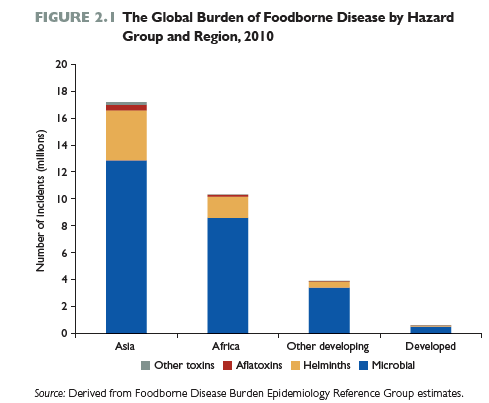Why foodborne disease is becoming a development priority—and is a solvable problem
- From
-
Published on
26.11.18
- Impact Area
The huge economic burden of foodborne disease is driven by public health not trade.
This opinion piece is written by Delia Grace Randolph, joint leader of the Animal and Human Health program at the International Livestock Research Institute (ILRI) and leader of the Food Safety flagship of the CGIAR Research Program on Agriculture for Nutrition and Health.
‘In the past, foodborne disease was rarely seen as a development priority. This all changed when the World Health Organization (WHO) published the first assessment of the global burden of foodborne disease. Covering just 31 hazards, the study found the health burden was comparable to that of HIV-AIDS, malaria or tuberculosis.
‘Unsurprisingly, the burden was most intense in Asia and sub-Saharan Africa and fell most heavily on children under five years of age. But surprising to many, most of the known burden comes from microbes and worms and not from the chemicals people tend to worry about more (although the study is not complete, and results are anticipated showing a high burden from heavy metals).
‘. . . A new report by the World Bank launched this week provides first estimates of the economic burden of foodborne disease.
The total productivity loss from foodborne disease (that is, loss in terms of human capital) in developing countries amounts to US $95 billion a year.
. . .
![]()
Related news
-

Unveiling a new vision for animal breeding in Africa
International Livestock Research Institute (ILRI)16.04.25-
Food security
The African Animal Breeding Network (AABNet), a new platform for animal breeding professionals to ad…
Read more -
-

Fostering collaboration and knowledge sharing in digital agriculture
International Livestock Research Institute (ILRI)16.04.25-
Food security
Stronger institutional partnerships and knowledge co-creation will accelerate the digital agricultur…
Read more -
-

How Bangladesh Saved Its Most Iconic Fish
WorldFish16.04.25-
Environmental health & biodiversity
-
Food security
Hilsa is everywhere in Bangladesh. It’s on dinner tables, in markets, in poetry, in history,…
Read more -

